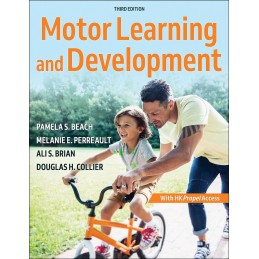Different from any other motor behavior text on the market,
Motor Learning and Development, Third Edition With HKPropel Access, combines two subdisciplines of motor behavior in an accessible and easy-to-follow manner. By uniting these two disciplines under the same cover, the text prepares students to create, apply, and evaluate motor skill programs for people of all skill and development levels.
Motor Learning and Development, Third Edition, outlines the fundamental concepts of both motor learning and motor development. It explores movement patterns across all ages throughout the human life span, including the influences of life transitions and individual and sociocultural constraints. The text provides a complete framework for students to consider the many variables for each individual and then create and implement developmentally appropriate movement programs.
The third edition has been revised and updated with current research and examples, and it includes the following enhancements::
- Expanded coverage of fundamental movement skills and skill classification
- Four new chapters exploring the assessment of gross motor development, sociocultural constraints, developmental models for instruction, and program design
- Additional videos illustrating fundamental motor skills, motor milestones, and infant reflexes
- New supplemental activities at the end of each chapter prompting students to apply concepts from the text to their own life experience
Motor Learning and Development, Third Edition, also has related online activities and video clips designed to encourage critical thinking and application of concepts. Lab activities, which can be assigned by instructors in HK
Propel, require students to complete hands-on assignments and draw conclusions. Over 90 videos demonstrate people of various ages, including infants, completing motor tasks so students can observe and assess movements throughout the life span firsthand.
Other learning aids within the book include chapter objectives, glossary terms, sidebars, and supplemental activities to emphasize the evolution from research to practice. Opening vignettes in each chapter demonstrate the breadth of professions that use research in motor behavior.
Motor Learning and Development, Third Edition, offers a foundation for understanding how humans acquire and continue to develop their movement skills throughout the life span.
Note:: A code for accessing HK
Propel is included with all new print books.


 Dostawa
Dostawa
 Płatność
Płatność
 Zwroty
Zwroty
